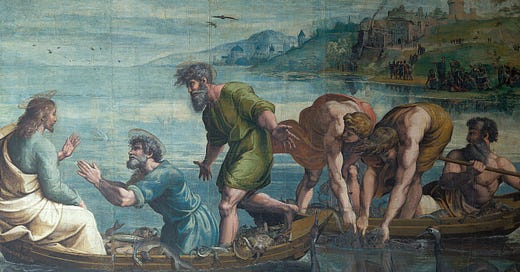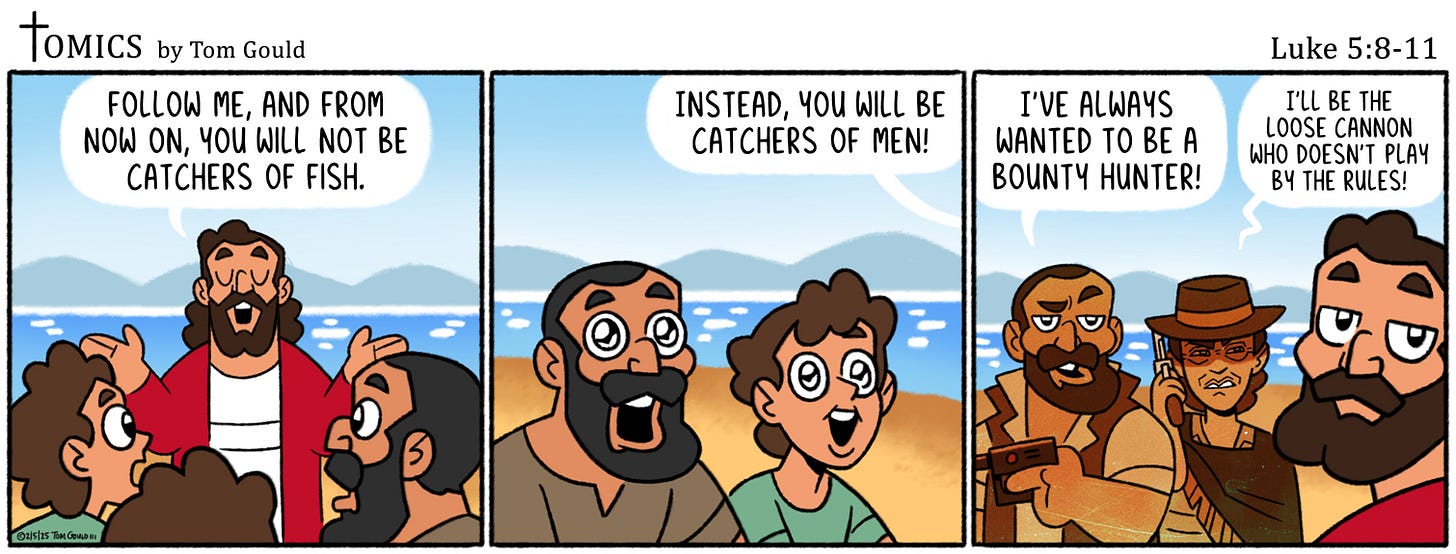This note from
doesn’t have anything to do with today’s readings, but it made me laugh, so I’m sharing it anyway—This comic from Tomics is related to today’s Gospel, and it made me laugh, so I’m sharing it—
Reading 1
Is 6:1-2a, 3-8
In the year King Uzziah died, I saw the Lord seated on a high and lofty throne, with the train of his garment filling the temple. Seraphim were stationed above.
They cried one to the other, "Holy, holy, holy is the LORD of hosts! All the earth is filled with his glory!" At the sound of that cry, the frame of the door shook and the house was filled with smoke.
Then I said, "Woe is me, I am doomed! For I am a man of unclean lips, living among a people of unclean lips; yet my eyes have seen the King, the LORD of hosts!" Then one of the seraphim flew to me, holding an ember that he had taken with tongs from the altar.
He touched my mouth with it, and said, "See, now that this has touched your lips, your wickedness is removed, your sin purged."
Then I heard the voice of the Lord saying, "Whom shall I send? Who will go for us?" "Here I am," I said; "send me!"
You’ll probably recognize the third verse from every mass you've ever been to in your entire life. Doesn't matter how old you are, because Christians have been singing it since the first century.
Although he spends much of his time railing against sinful Israel, Isaiah doesn't consider himself worthy to see God. Which is accurate, none of us are. The Israelites believed that anyone who wasn't worthy to see the face of God would die at the sight. Which is why he shouts, "I am doomed!"
But not the only reason. Isaiah liked puns, and the word for "doomed" has another meaning—to be struck mute. It's God's messenger who prepares him for his mission of prophecy.
That's as good a reason as any to go to confession. We need to be prepared to spread the good news.
Responsorial Psalm
Ps 138:1-2, 2-3, 4-5, 7-8
R. (1c) In the sight of the angels I will sing your praises, Lord.
I will give thanks to you, O LORD, with all my heart,
for you have heard the words of my mouth;
in the presence of the angels I will sing your praise;
I will worship at your holy temple
and give thanks to your name.
R. In the sight of the angels I will sing your praises, Lord.
Because of your kindness and your truth;
for you have made great above all things
your name and your promise.
When I called, you answered me;
you built up strength within me.
R. In the sight of the angels I will sing your praises, Lord.
All the kings of the earth shall give thanks to you, O LORD,
when they hear the words of your mouth;
and they shall sing of the ways of the LORD:
"Great is the glory of the LORD."
R. In the sight of the angels I will sing your praises, Lord.
Your right hand saves me.
The LORD will complete what he has done for me;
your kindness, O LORD, endures forever;
forsake not the work of your hands.
R. In the sight of the angels I will sing your praises, Lord.
The angels live with of God; they know his glory directly and personally. Yet, the psalmist is so grateful, he’s going to sing God’s praises in the angel’s presence.
“I know you know God is great, but listen up, angels, let me tell you how God is really great…” Have you ever been so grateful that you want to tell angels about it?
Reading 1
1 Cor 15:1-11
I am reminding you, brothers and sisters, of the Gospel I preached to you, which you indeed received and in which you also stand. Through it you are also being saved, if you hold fast to the word I preached to you, unless you believed in vain. For I handed on to you as of first importance what I also received: that Christ died for our sins in accordance with the Scriptures; that he was buried; that he was raised on the third day in accordance with the Scriptures; that he appeared to Cephas, then to the Twelve. After that, he appeared to more than five hundred brothers at once, most of whom are still living, though some have fallen asleep. After that he appeared to James, then to all the Apostles.
Last of all, as to one born abnormally, he appeared to me. For I am the least of the Apostles, not fit to be called an Apostle, because I persecuted the Church of God. But by the grace of God I am what I am, and his grace to me has not been ineffective. Indeed, I have toiled harder than all of them; not I, however, but the grace of God that is with me. Therefore, whether it be I or they, so we preach and so you believed.
This is one of the oldest versions of the creed we're aware of. Sometimes we might wonder what's changed in the Church over the millennia, and obviously, a lot has. But the core of our faith, the most important part, has not—Jesus died, really died, and rose from the dead. He fulfilled the scriptures.
He did this to forgive our sins, even the worst of them, even the people who executed Him and persecuted His followers. If Paul, the worst of those persecutors, can become the greatest Apostle, there's hope for us, too.
Alleluia
Mt 4:19
R. Alleluia, alleluia.
Come after me
and I will make you fishers of men.
R. Alleluia, alleluia.
Whenever we quote this line in mass, I am always amazed that Jesus’ pun works in Aramaic (which Jesus spoke), Greek (the language in which Matthew was written), and English (what you’re obviously reading right now).
Gospel
Lk 5:1-11
While the crowd was pressing in on Jesus and listening to the word of God, he was standing by the Lake of Gennesaret. He saw two boats there alongside the lake; the fishermen had disembarked and were washing their nets. Getting into one of the boats, the one belonging to Simon, he asked him to put out a short distance from the shore. Then he sat down and taught the crowds from the boat. After he had finished speaking, he said to Simon, "Put out into deep water and lower your nets for a catch."
Simon said in reply, "Master, we have worked hard all night and have caught nothing, but at your command I will lower the nets."
When they had done this, they caught a great number of fish and their nets were tearing. They signaled to their partners in the other boat to come to help them. They came and filled both boats so that the boats were in danger of sinking. When Simon Peter saw this, he fell at the knees of Jesus and said, "Depart from me, Lord, for I am a sinful man."
For astonishment at the catch of fish they had made seized him and all those with him, and likewise James and John, the sons of Zebedee, who were partners of Simon. Jesus said to Simon, "Do not be afraid; from now on you will be catching men." When they brought their boats to the shore, they left everything and followed him.
Sometimes we have faith that moves mountains. Sometimes, we’re not as confident in all this Jesus business. And yet, we do what we’re asked, anyway. Such is the case with (Simon) Peter today. He doesn’t have enough faith to believe that casting the net will do any good, but (and this is the important part) he does anyway.
It’s like what C.S. Lewis says about faith: “Roughly speaking, the word faith seems to be used by Christians in two senses or on two levels... In the first sense it means simply belief—accepting or regarding as true the doctrines of Christianity. Faith, in the [second] sense in which I am here using the word, is the art of holding onto things your reason has once accepted, in spite of your changing moods. For moods will change, whatever view your reason takes.”
Peter’s been on a boat all night, and hasn’t caught a single fish. He’s tired, he’s sweaty, he’s in no mood for some carpenter to tell him how to catch fish. And yet… he puts his faith in Christ. We does what Jesus asks, even if he doesn’t understand, or even fully believe. He does it anyway.
It’s probably among the hardest lessons for Catholics to learn, when it comes to our faithful actions with respect to God and the Church. The sacraments are important, Sunday mass is important, faithful obedience to God’s commandments is important. Even if we don’t get it, even if we don’t understand, if we have questions, faith compels us to do the work anyway.





